#problem formulation with example
Explore tagged Tumblr posts
Note
Regarding your post(s) about investigation checks and the like, there's something that's bothering me, and it bothered me for a while. Not in regard to investigation, but charisma (and similar checks, diplomacy, negotiation, persuasion, whatever the game calls it).
In a TTRPG with skills, those skills are an abstraction meant to simulate a characters actual capabilities. If I want to make a character who can effortlessly jump from rooftop to rooftop, I'll give them high Athletics, Agility, Endurance, whatever. Maybe some feats, abilities, perks, advantages etc that pertain to jumping. Now, if I want my character to jump from rooftop to rooftop, I just roll the dice, and the skills, attributes, perks etc will make sure I have a high likelihood of success. I don't need to prove to the GM or the group that I myself could make that jump.
But now let's talk about Charisma checks. I've often heard stories of groups who say they don't make those checks, they just let the player make the argument, and if the GM is convinced, they "pass." But like... that means the character will always be as persuasive as the player. If the player isn't good at formulating an argument, the character won't be, either. Same with perception, investigation, etc. Sometimes, players just aren't good at picking up on hints and clues and/or they're not good at drawing conclusions from the clues they have. So that means that they can't play as a character who is?
Don't get me wrong, I get your point, I just find this is an issue worth thinking about. Why are things like athleticism, stealth, and combat prowess, or even things like lockpicking, hacking, or repairing stuff okay to abstract away as dice rolls, but deduction, perception, and maybe also persuasion and rhetoric aren't? Or, maybe the better, more constructive question: How would you propose handling a player playing a character whose skills exceed the player's?
I also think it's an issue worth thinking about, but I think "thinking about it" also has to involve asking the questions "why is this a problem?" and "is this ACTUALLY a problem?"
Like this discussion comes with the prepackaged assumption that allowing you to play a character whose abilities exceed yours as a player is both a) a universally desirable thing, and b) something that must be treated as a game design priority. And, with that assumption, it's logical to conclude that a TTRPG has an *obligation* to allow you to play a character whose abilities are not limited by yours as a player in any way, and not allowing you to do so constitutes a failure on the game's part.
But let's question that assumption a little bit. Because, the way I see it "allowing you to play a character who is good at X even if that's something that you, personally, are not good at" is not an inherently desirable design goal. It's a value-neutral feature, and it becomes a good or bad design goal to pursue depending on what X is and whether abstracting X so that the player doesn't have to engage with it benefits or detracts from the desired gameplay experience.
Let's for example, imagine a TTRPG with wargame elements, where, among other things to do, there are situations where your character can assume command of an army to engage in large-scale battles. It's pretty clear that, in such a game, you simply can't play as a character who is a better tactician than you, the player, are. If I'm not a good tactician, I don't get to play a character who's supposed to be the most brilliant tactician in all the land. That's simply not a character concept I get to play unless I am also skilled at tactical decision-making.
Is that inherently a problem to be solved? If we got rid of tactical decision-making as an activity that the players have to engage in, and instead gave the characters a "Tactics" skill and we used a Tactics skill check to determine whether they win or lose a battle, that would certainly allow a player who's bad at tactics the freedom to play a character who's the best tactician ever. But would this be an objectively good change? I'd say no, because it would skip past the entire point of the wargame elements, which is engaging as a player with the process of tactical decision-making, and that's not something that I'd consider worth sacrificing in pursuit of allowing the player to play a character whose skills exceed theirs in this particular aspect.
To name a more concrete example that someone else mentioned in the notes of that post: Mothership has no equivalent of a stealth skill, despite being a game where a lot of your playtime is spent hiding from some flavor of Scary Space Monster, because if the game abstracted stealth that way the resolution to any situation where you're trying to hide from a Scary Space Monster would be saying "I roll stealth" and hoping you roll high enough. Without a stealth skill, you're forced to participate in the narrative conversation of paying attention to the GM's description of the environment, ask clarifying questions if needed, and describe how you try to hide in the space presented to you.
This, once again, presents a situation where your character's skills are limited by your own. It's pretty clear that your character can only be as good at hiding as you are at thinking of places to hide and describing how they hide in them, and that if the game took the "i roll stealth" approach instead, it would solve the "problem" of your character's skills being limited by your own in this particular way. But is solving this "problem" worth sacrificing the tension that the game seeks to create by deliberately refusing to abstract stealth in this way?
So yeah... I think lacking skill checks for stuff such as perception or investigation makes a dungeon-crawling game better because it forces the players to narratively engage with the environment as a real place when they're looking for something, and it's also true that the lack of such mechanics kinda does mean that a player who just isn't good at picking up hints and clues from environmental details simply doesn't get to play a character who is supposed to be good at picking up hints and clues from environmental details. But I think that ensuring a player's ability to play such a character regardless of their real-life skill level is not a design goal that a game has any inherent obligation to pursue, especially not at the cost of skipping over the actions that, to me, are the meat and potatoes of a dungeon crawl.
My answer to "why is it okay to abstract certain skills as dice rolls and not others" is that games are allowed to make decisions about which actions they want to skip over with a dice roll and which actions they want the players to have to exercise direct narrative control and mastery of, and sometimes that's gonna interfere with their freedom to play a character whose skills exceed theirs, and that's okay because sometimes other game design goals are going to have priority over the goal of ensuring the character's skills aren't limited by the player's real-life skills in any conceivable way.
293 notes
·
View notes
Text
fuck it ill do it myself
Being in a Relationship with Someone with NPD for Dummies
**I would like to open with the preface that if someone is not willing to work on their NPD or to work through elements of their mental illness that strains your relationship, then they are not ready to be in a relationship. I got super lucky in that my partner was over-therapised tbh and so is able and willing to make the accommodations I mention here but that will not be the case for everyone. Think it through carefully. Everyone deserves love, but they should never feel like they need to sacrifice their own wellbeing to give it and get it in return. Be safe and look after yourself**
This is written for people in romantic relationships but with some editing, it could be useful for platonic relationships also
So, the first thing I want to explain is Narc crashes. Maybe you've heard about them, maybe you haven't but understanding them is, I think, the most important piece of groundwork you could have. Think of NPD as a hard shell over something very soft and gooey. Anything can cause the shell to crack, even the most gentle of taps. And those cracks can vary in size, so that sometimes only a little bit of the insides ooze out, and sometimes a lot pours out all at once. Someone with NPD has built their ego and external image to shelter a typically very young and fragile version of themselves. And when that shell breaks, it can feel like an attack on that weaker part. NPD crashes look different depending on the person. For me, as an example, I get this overwhelming feeling that I am going to be discarded and left alone. Which is particularly unhelpful in a romantic relationship but we'll get there. For other people, depending on the severity, they could lash out, get very defensive, or start having ideas about self harm and suicide. I don't really get that bad anymore, but I also haven't crashed so catastrophically in recent months.
On to specific advice!
Make a plan of what to do in the case of a crash. This can be anything from, 'tell me that you still love me and that you aren't going to leave' to 'leave me alone, I can't regulate around other people'. It could be physical comfort, it could be getting them something sweet to eat when they are calmer, or it could be a bath. Have a conversation about it when you are both in a good mental state and make a plan. Keep in mind the differences in severity so that you know what to do and how to react.
When you have a problem, bring it up gently and carefully. When they are doing something that you want to question or ask for them to do differently, remember that they will take it badly if you handle it wrong. I don't mean 'just let them do whatever they want forever'. That is both unhelpful and unrealistic. Of course there are going to be things you need to discuss. Just be cautious about your words being interpreted as a threat to them. This can be another thing you discuss together ahead of time so that you can formulate a way of phrasing such things in a way that they feel more comfortable with.
Keep your emotions under control. If you are mad at your partner with NPD for something, get a hold of that anger by yourself first and then bring it up with them when you are calmer. Getting angry at someone with NPD creates a loop of them feeding off your anger, getting anxious and overwhelmed by the perceived aggressive nature of the conversation, and immediately going into defense mode - which tends to make you angrier and then it just loops around again and no one benefits from that. I mean, I think this applies to all relationships but taking out your own emotional responses on your partner is especially damaging when they have NPD. It hurts us much more deeply and for much longer.
To break those things down to their base components, you need to have a lot of patience and emotional maturity. Which is a big ask, and I'm sure there are people out there who have made it work somehow without those things. I don't know of any personally, but I'm sure it has happened before. Either way, make sure that the relationship works for you too. If you have to go to all this effort for the one you love, they should be willing to do the work for you too.
People with NPD deserve to be loved, but no one deserves having to hurt themselves to keep loving the one who is doing that harm in the first place.
Mental health is complicated. Personality disorders are complicated. Frankly, people are complicated. Maybe some of what I've said is valuable to you and your partner, and maybe none of it is and you are still able to be in a healthy relationship, even if it looks different to mine. And that's great! As long as it works for you both, do whatever you want forever.
Just be safe and take care of yourself first and foremost.
#cluster b#actually narcissistic#actually aspd#npd#actually npd#aspd#npd safe#aspd safe#cluster b safe#relationships
330 notes
·
View notes
Text
Denji no longer has access to his heart
The golden rule in Chainsaw Man is to focus on the title, since it's the key to reading the story.
Rain, Brothel, Removal seem to be three absurdly unrelated elements, and Fujimoto likes to put it that way, because the challenge for the reader is to find a way of reading that links them together.

This chapter is funny as well as disturbing, deeply sad, and in itself this collection of sensations just makes you uncomfortable, since the tone is always reversed, and the protagonist himself refuses to allow his situation to be a comic spring.
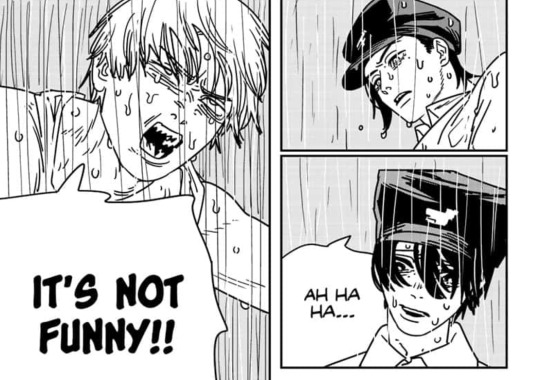
Fujimoto confirms an interpretation that is fundamental to understanding Denji: his character thinks only in terms of short-term objectives, incapable of projecting himself, just as he responds only to the satisfaction of needs without being able to verbalize and think about his unhappiness in a more abstract way.
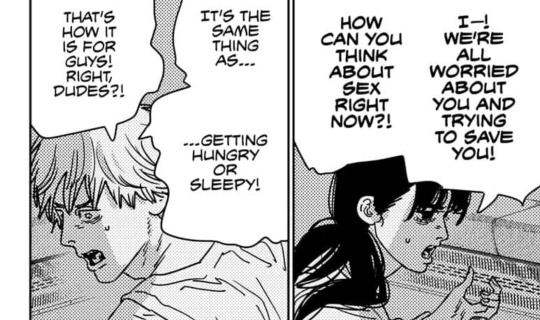
Denji, for example, isn't thinking about whether sex is actually a solution to his problems, no, it's more concrete than that: he's thinking about whether he's masturbated recently.
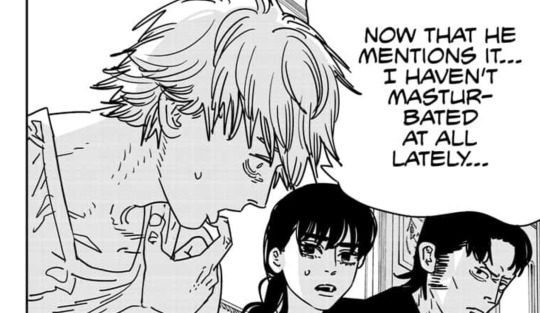
Another piece of evidence is the rain. I've always thought that when it rains in Fujimoto's works, it's proof that no lies are being told.
Whether in Look Back with a silent victory, the school moment with Reze and Denji.
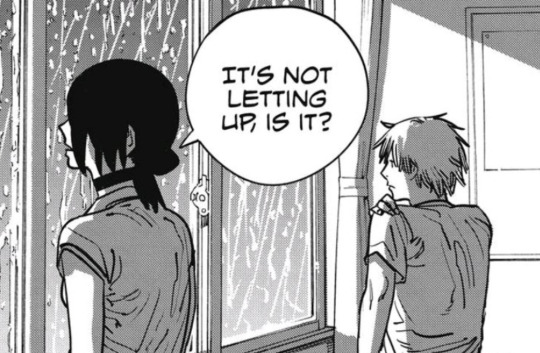
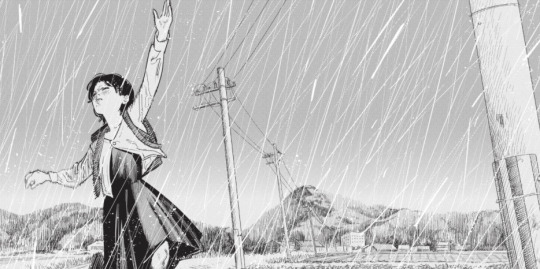
But that's not what we're interested in here, because there's no doubt that Denji is sincere, or at least the rain only shows us that he's sincerely desperate.
There's a subtlety....
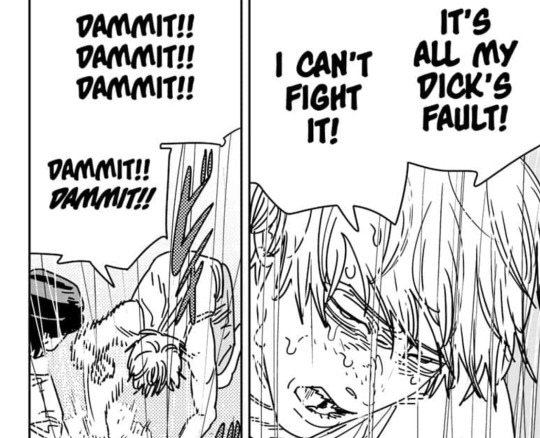
Denji complains that he only thinks with his dick, but there's another, more philosophical and certainly less funny idea behind this: Denji only thinks through his body.
The rain, the amputation, the brothel - they're all proof that Denji only thinks with his senses.
Denji thought the brothel was the solution to his distress, it's when it started raining that he collapsed, as if the change in weather had evoked his own emotional change. Yoru's solution is amputation, another physical sensation and solution.

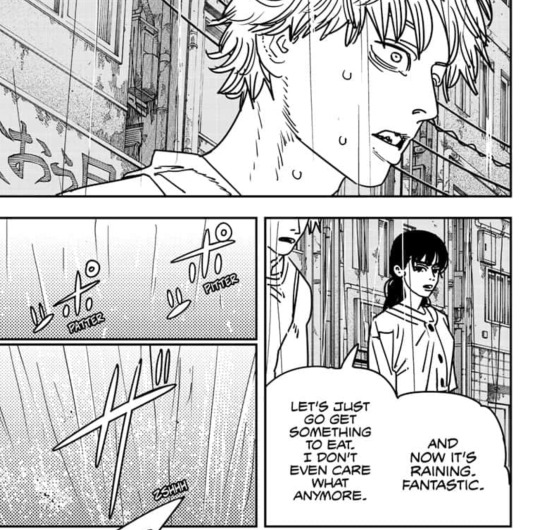
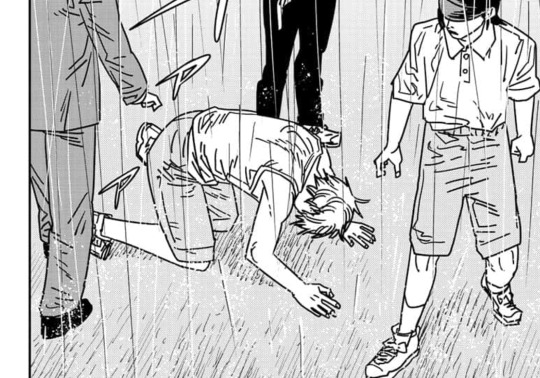
Amputation is a solution all the more symbolic because it's antithetical to what Denji is: a demon man capable of regeneration.
To amputate is in itself not to regenerate, and not to regenerate is in itself to be more human.
What distinguishes us from animals (although science relativizes this) is the way we think about our own emotions, something Denji is incapable of doing, or at least has great difficulty in doing.
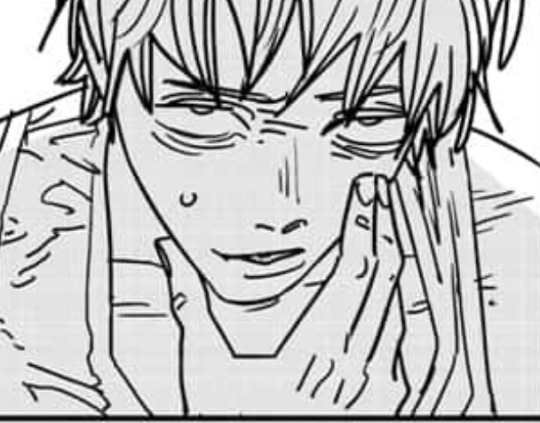
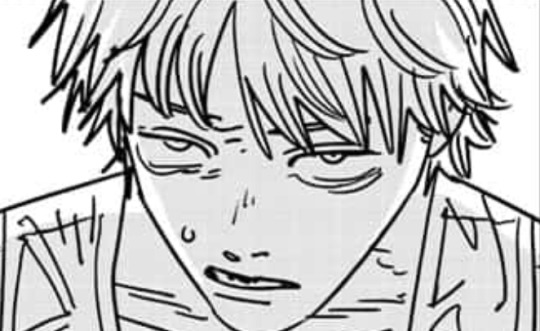

This doesn't mean he can't verbalize it at all, but when he evokes, he evokes a sensation, a dish (a shitty hamburger, a steak, a ton of sex).
Even when he wants to be loved, Denji formulates it in the form of wanting his heart, almost organically.
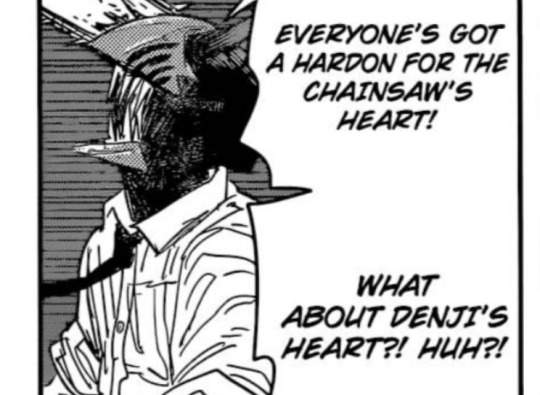
No one wants Denji's heart because it's gone
And it makes sense, because Pochita has reassembled his entire body, except for Denji's heart, which has literally been left in that garbage can.
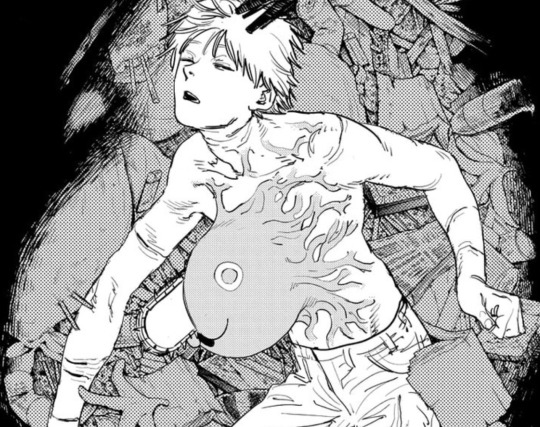
That's why, when Pochita lets Denji access his feelings, the place is symbolized by a garbage can.
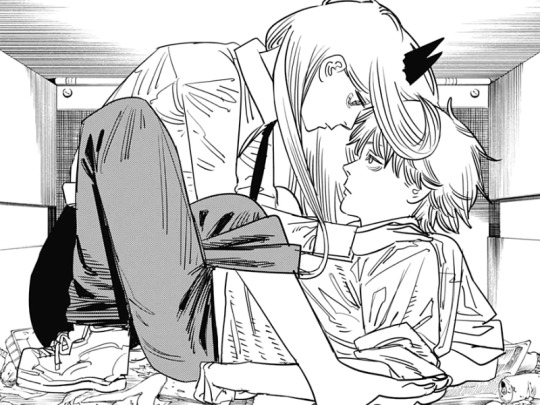
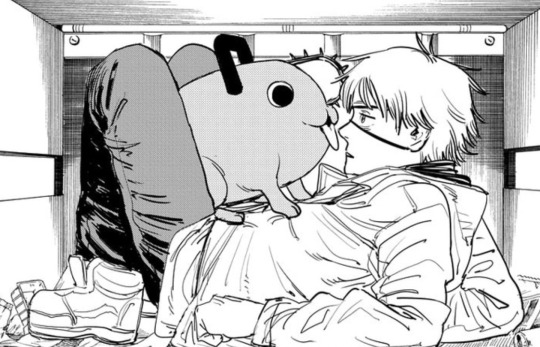
When Denji asks Pochita to wake up to find Nayuta, Pochita asks him where his legs are, because Denji's only function is to be a body.
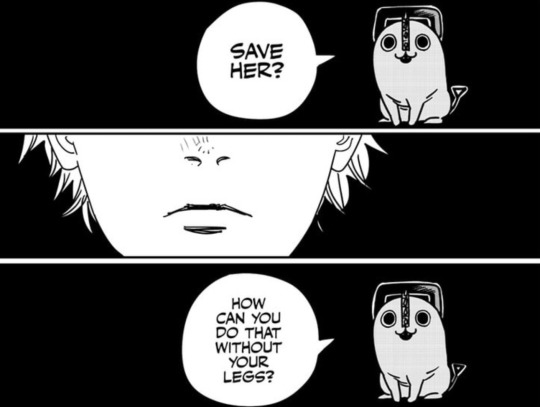
And now everything makes sense again
When Denji spoke his dream to Pochita, being Chainsaw Man, I think there was a certain feeling in every reader: what exactly does it change?
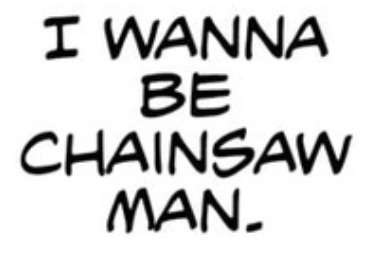
What if it changes nothing? It's normal for Denji not to be able to project himself in the long term, as he should symbolically listen to his heart.
Denji's inability to have a dream, a goal for the future, is symbolized by him and Pochita as children.
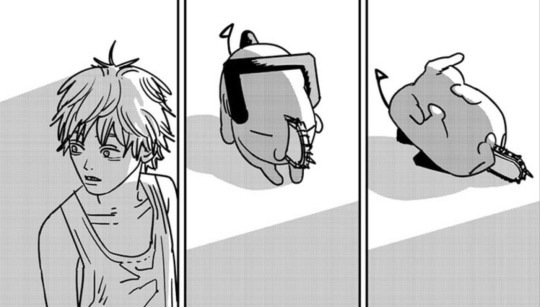
It doesn't mean that Pochita is an antagonist (although that could be cool), but that Denji and Pochita are prisoners of their own situations.
Denji doesn't have access to his heart, but Pochita is contractually bound to what Denji wants.
This is also why, when Denji reproaches himself, it's his child self who's addressing him, because the only way to reproach himself, to feel guilty, is symbolized by his old self, the Denji that Pochita may have known. Just as Denji doesn't have access to his heart, Pochita has difficulty gaining access to the person Denji has become, all of which only leads to stagnation.
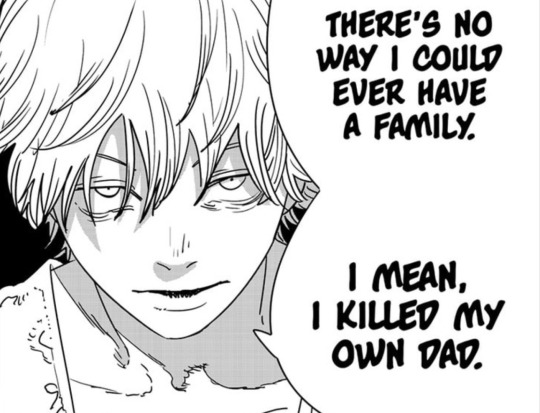
Denji as a child is also the symbol of a scumbag, the remnant of a lost heart, always dressed in poor, dirty clothes, a past that Denji seeks to escape, but a past that is the only time Pochita has been able to get to know Denji.

I know it's a pretty crazy line, but it's precisely because Denji is Chainsaw Man - a being both fused and disconnected - that he thinks with his dick lol
Saving Chainsaw Man by killing Chainsaw Man has never been a truer statement
Chainsaw Man is Denji's prison but also his only hope
A cage
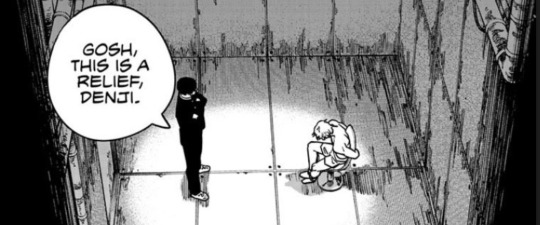
#csm#chainsaw man spoilers#chainsaw man#csm part 2#csm spoilers#csm 166#csm 156#csm 150#denji#denji hayakawa#asa mitaka#katana man#my thoughts
801 notes
·
View notes
Text
The DBT Cope Ahead skill is the one that I found most helpful at the beginning of my journey. Though this did involve some knowledge of others skills to do, it helped me be prepared for strong emotions and tough situations.
One of the things I recommend the most when giving advice is planning ahead. Planning out grounding techniques or coping skills that you can use to make it easier to recall and use those skills in stressful situations. This skill does that, but also makes plans for specific situations.
This skill is intended to help us plan for certain situations that invoke certain feelings. It can help us be prepared for stress. This goal of this skill is to formulate a plan so that we can effectively use our skills.
Step One - Think of a situation that may spark uncomfortable emotions.
This might be one that you know you've had before (like a struggle in a relationship, or something you struggle to cope with, or any number of things you think you could use help preparing for.) Then describe the situation. When describing the situation, try to identify feelings you think would be likely to come up. If relevant to you, what urges may come up as well? Perhaps you know that in the past you've felt angry. Maybe you know you've had a panic attack before. Maybe you know you've had urges to do something destructive.
Step Two - Decide what coping or skills you might use
For me, I sit down and I think about what the problems are, and then I look at how I can solve those problems.
If you know that you feel angry, how could you cope with that? For me, I know that walking away to collect my thoughts is the best way for me to handle my anger so I might write down that's what I'd do. I also may know I'd have urges to say something harmful, or lash out. In that case, I'd write down that I'd use my urge surfing skill.
If it's a relationship issue, what skills could you utilize to solve the problem? Skills like DEAR MAN can be effective for communicating effectively. Other interpersonal skills may also be useful here! FAST and GIVE are two others ones I like to use.
If I know I'll struggle to make a decision on what to do, I might also plan to use a skill like WISE MIND.
If it's something like I know I spiral anytime a friend cancels a plan, or something like that, I might familiarize myself with Check the Facts.
There are a lot of DBT skills, and coping methods outside of DBT that can be useful. Planning ahead can make it easier to recall what skills to use, and having practiced them beforehand can help make them easier to apply in a stressful situation.
Step Three - Imagine the scenario and rehearse how you'd handle it.
How do the skills you've picked fit into the possible situation? If it's a skill like WISE MIND, or DEAR MAN that have multiple steps to them, maybe write out how those steps may play out.
Practice this until you feel you could apply this skill. It's okay if this step isn't perfect. In fact, it's normal. It's okay to need to try and it a few times. It's okay for this skill to be a work in progress.
See below the read more for an example situation:
Step One - I know my friend has mentioned coming down with something. It's really possible that she cancels our plans this weekend. I know that if that happens, despite there being a valid reason, I start spiraling and thinking that she hates me. This spiraling can lead to me panicking, or lashing out.
Step Two - One way I can cope is to use my Urge Surfing skill to resist my urges to lash out at her. I can also use Check the Facts so that I can challenge the irrational thoughts. Another way I cope is by re-reading screenshots that affirm that she cares about me. If I still feel it's not resolved, I can ask my friend for reassurance in a healthy, non confrontational way.
Step Three - If my friend cancels my plans, I will tell her "Thank you for letting me know. I'm disappointed I won't get to see you, but I really hope that you feel better soon!"
Then I will step away to collect my thoughts, and take some deep breaths. I might use my 54321 method to ground myself. If I begin having urges to lash out and say "Okay, I get that you don't want to see me", I'll use my urge surfing skill and remind myself that I can ride this wave. Having an urge doesn't mean I need to act on it, and then I will remind myself it will pass.
I will open up the note on my phone that walks me through Check the Facts. Using this skill will help me challenge my thoughts. It will remind me that my spiraling thoughts that she always cancels and doesn't want to see me aren't true because she hung out with me recently. The fact that it feels she always cancels doesn't mean it's true. I might realize that while my emotions are valid, they don't "fit the facts". If I'm struggle to check the facts, I will reach out to my other friend to help me check the facts.
If after this, I am still feeling insecure or like spiraling, I might reach out to my friend and say 'Hey, I'm having a bad brain day. When you have some energy, could you please give me some reassurance?"
I might also ask if we can plan another hang out for when she's feeling better. Having a future plan might help my anxiety.
Knowing she is sick means she might not have the energy to answer me, and I will be prepared with other coping methods if that happens so I don't spiral. I will reach out to my other friend, put on a comfort show to distract myself, or use another self-soothing technique.
195 notes
·
View notes
Text
Puppy Love
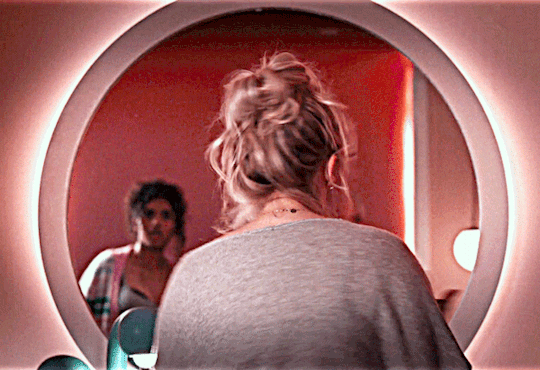
Regina George x Reader
Word Count: 1k
Trigger Warnings: there is so much fluff in here that it's crazy, also a puppy is in here so prepare your hearts for a lot of love
Request:
Can I request a Regina George x Fem!reader for Renee rapp? Please anything I'm like in a dry desert with no water, please feed the homosexuals. Thanks so much!
Mean Girls requests are open.
Regina narrowed her eyes at the puppy that was taking (Y/n)'s attention. It was a golden retriever puppy that (Y/n) named Apollo. He was cute, and Regina could admit that. However, it sucked (Y/n)'s attention away entirely from her and to this dog. Regina knew this jealousy was petty and dumb, but Apollo was becoming a problem for Regina. For example, just moments before now, she and (Y/n) had been making out, but when Apollo came crying to the door, scratching on it, (Y/n) was up in seconds. Now, instead of (Y/n) holding her close, she was cradling a puppy who would never truly appreciate her.
"Wait," Cady said, formulating everything Regina was telling the group. (Y/n) hadn't joined them yet because she was too busy showing one of their classmates pictures she had taken of Apollo. "So, let me get this straight. You are jealous of Apollo? Her incredibly adorable golden retriever puppy? I'm not sure I understand why."
Regina's eyes narrowed at Cady when she said this, causing Cady's eyes to look anywhere but towards Regina. Even if the clique system had officially been brought down by the exposure of the Burn Book, Regina was scary. "You don't understand, Cady. I have lost a lot of make-out time because he will come pawing at the door. When we study at her place, it turns into a session where I study and she plays with Apollo. He's not even that cute." Regina stuck up her nose, knowing what she was saying was out of anger. She knew that Apollo was incredibly cute, and at first, so were all of (Y/n)'s interactions with him.
(Y/n) approached the group with a wide smile on her face, kissing Regina's cheek as she sat down. "Hey, everyone," she greeted, not catching on to how everyone but Regina avoided her eye. A tell-tell sign that they were talking about her, but (Y/n) was absolutely oblivious. "Does anyone want to see this video I got of Apollo at his puppy training class yesterday? The teacher said he was her best student. She said he was 'paw-some.'" (Y/n) said with a bright smile, not noticing Regina roll her eyes. Cady was the first to look over, excited to see Apollo, Karen followed, and then the rest of the group was awe-ing over how cute Apollo was. Regina was seething.
"Are you still coming over, princess?" (Y/n) looked over at Regina with a smile, but it quickly dropped when she saw Regina's expression. She looked sour as she stared at her now cold cheese fries in front of her. (Y/n) was trying to figure out if she had that same expression when she sat down earlier, or if she had just missed it. She was hoping that whatever it was, Regina wasn't mad at her. "Hey, Regina, what's wrong, babe? You look upset about something. Is there anything I can help with?"
Regina resisted the urge to say anything that she might regret late. Instead, she kissed (Y/n) with a soft smile. "No, love, just thinking. I'll definitely get over it though. Yes, I will see you later today." Regina promised, and the group looked around at each other quietly. The bell rang, and the group split up. Regina had dropped (Y/n) off at her class, and then she went with Gretchen to their shared math class. "I should've said, the problem is she loves her dog more than me," Regina grumbled to Gretchen, who decided it was best to say nothing. She didn't want to contribute to Regina's anger.
After school, (Y/n) was playing with Regina's hair when she heard the familiar pawing at her door. "There's Apollo, I'm going to let him in." (Y/n) kissed her girlfriend before letting the puppy in. "I'm going to use the bathroom fast, too. Do you think you can watch him?" (Y/n) questioned as she brought the dog over to Regina. The puppy squirmed excitedly as he was placed in front of Regina, running up to her and licking her on the face. (Y/n) patted his head before taking her momentary leave.
"Stop it, stop it," Regina held Apollo away from her as she examined him with a sneer. Letting out a little bark, he attempted to lick Regina again, even if he was at a far distance. Regina didn't realize at first that she smiled at that, but when she did; she looked around quickly to make sure nobody witnessed it. She let go of Apollo and the puppy came bounding over to her, curling up to her side as he allowed her to scratch behind his ear. "Okay, I think I'm starting to get it now… You are kind of cute, I guess."
(Y/n) grinned when she came back to the room, happy to see Regina finally warming up to her puppy. She knew she was struggling to share the attention when she came over, but puppies need a lot of attention, too. "Look at these two cuties," she took a picture before lying beside Regina, Apollo resting in the middle. "I'm glad you seem to like him. I thought you couldn't stand him. I was beginning to get worried you might be jealous of him or something." (Y/n) said, addressing how she would never want to make Regina feel that way,
Regina shook her head, hiding the lie between her teeth. "What, no? I was never jealous of Apollo, He's a cute puppy." Regina said simply, hoping she didn't give herself away too easily.
Her comment made (Y/n)'s brow raise, but she said nothing, not wanting to accuse Regina of not telling the truth. Instead, she planted a kiss on Regina's lips. "And you are my cute girlfriend. I love that you love Apollo." (Y/n) said happily, snuggling Regina and Apollo. She couldn't wait to make that picture of Regina snuggled up to Apollo her screensaver later.
879 notes
·
View notes
Text
Writing Notes: Philosophy

Philosophy - aims to ascertain basic existentialist truths of the world around us.
The term comes from “philosophia,” a word that has Greek and Latin origins.
Philosophers examine the nature of reality by posing philosophical questions or problems that they then attempt to solve through critical thinking.
Branches of Philosophy
Much of the value of philosophy lies in the specialization and categorization of philosophical questions that cannot be easily answered with empirical data or scientific knowledge.
Scholars organize such questions into different branches of thought, although there are perhaps as many ways of categorizing the different branches as there are scholars.
Here are just 3 of the potentially dozens of branches of philosophy:
Epistemology: Also called the theory of knowledge, this analytic philosophy studies the scope, validity, and extent of human knowledge—in other words, concepts surrounding how we can confirm what we think we know is true. Immanuel Kant’s Critique of Pure Reason is an example of epistemology. In this work, Kant disagrees with philosopher David Hume, that our experiences and perceptions of things are subjective—therefore, our knowledge of things is not universal. Epistemology overlaps with many other branches of philosophy since human knowledge is relevant in other areas, such as the philosophy of language and the philosophy of mind.
Ethics: The moral philosophy of ethics is one of the oldest and broadest branches of philosophy. Ethics works to debate values of good and evil and questions where human actions fall on that spectrum. The ancient Greeks struggled with these questions as they developed their societies along two schools of thought—Stoicism and Epicureanism. Although these two schools, established in 300 BC, shared several tenets, they differed in describing the best way to live. Stoics believed that living a just and virtuous life was paramount, while Epicureans believed the search for pleasure should be the highest priority. Due to its broad nature, ethics is pervasive in nearly every academic discipline and overlaps within several other areas of thought, including the philosophy of history, the philosophy of law, and the philosophy of religion.
Metaphysics: The principles of metaphysics question our place in the world and the meaning of life and human existence. Metaphysics, like ethics, began as one of the main branches of philosophy in ancient Greece. One of the premier philosophical works that established the branch was Aristotle’s Physics. In exploring the working mechanics of our reality, Aristotle created foundations of thought that became important to western institutions and religions, like Christianity. Aristotle’s work greatly influenced the thirteenth-century Italian priest Thomas Aquinas, who utilized aspects of Aristotle’s philosophy of nature to confirm the existence of God as the omnipotent architect of the universe. Metaphysics often encompasses or overlaps with the philosophy of science—for example, as scientists grapple with questions related to humanity’s literal and figurative place in the universe.
Historical Figures of Eastern Philosophy
Learn how these notable eastern philosophers shaped their cultures with religion and philosophical breakthroughs throughout the history of philosophy:
Laozi (born circa 570 BCE): The historical existence of Laozi, or Lao Tzu, is disputed, but some believe the Chinese philosopher is the author of the Tao Te Ching, a manuscript central to the philosophical religion known as Daoism (or Taoism). The metaphysical and ethical philosophy promotes living in harmony with nature and doing no harm to others.
Confucius (551–479 BCE): The teachings of this Chinese philosopher and politician formulated the basic tenets of East Asian societies. Known as Confucianism, the Chinese philosophy encouraged family loyalty, ancestral appreciation, and education—concepts that remain important to modern Chinese traditions.
Siddhartha Gautama (born in fifth century BCE): Historians and academics dispute the facts of the life of Siddhartha Gautama, also known as the Buddha. By some traditions, he was born into an aristocratic family and enjoyed an entitled life until he decided to pursue a nomadic and ascetic lifestyle. Over time, people attributed teachings to him on self-restraint, meditation, and mindfulness—ideas that grew into a popular world religion.
Jalāl ad-Dīn Mohammad Rūmī (1207–1273): A thirteenth-century Persian poet, Jalāl ad-Dīn Mohammad Rūmī wrote Quranic verses and Sufi poems that scholars still translate and publish today. A large part of philosophy in Rumi’s poetry is his set of values around love and religion. His philosophy of life focused on using art and self-expression to bring humans closer to God.
Historical Figures of Western Philosophy
Ancient Greek philosophers established western philosophy as early as the sixth century BCE. Here are a handful of Greek philosophy figures who created theoretical foundations and frameworks that future generations could use to question their own complex societies:
Socrates (470–399 BCE): The Athenian philosopher Socrates is credited as the founding father of western philosophy and the Socratic method—a form of questioning that scholars in multiple areas of philosophy use to pinpoint shortcomings in logic or beliefs. His teachings were never published but lived on through the work of his student, Plato.
Plato (428/427–348/347 BCE): An influential thinker of the classical Greek period, Plato is famous for his theory of forms, which questions the connection between our minds and reality. He is also remembered for his several published works, like The Republic, which communicated his social and political philosophy.
Aristotle (384–322 BCE): The philosopher Aristotle was a star pupil of Plato’s (another ancient philosopher) and went on to found his own school, called Lyceum. During his career, Aristotle collected and simplified the philosophies of his predecessors and contributed to philosophical work in nearly every aspect of classical Greek culture. He was the first ancient philosopher to analyze the concept of free will.
René Descartes (1596–1650): A French mathematician and philosopher, René Descartes is best known for the existentialism theories he put forth in Discourse on the Method and his statement: “I think, therefore I am.” Descartes’ natural philosophy and metaphysical inquiries, as well as his thoughts on the existence of God, established him as a pioneer of modern philosophy.
Georg Wilhelm Friedrich Hegel (1770–1831): German philosopher Georg Hegel is best known for his metaphysical concept known as idealism. The concept dictates that the perceptions of a self-conscious mind result in the most accurate interpretations of concrete objects. His work had a dramatic impact on western philosophy in the twentieth century and influenced the works of philosophers Karl Marx and Friedrich Nietzsche.
Source ⚜ More: Notes & References ⚜ Writing Resources PDFs
#philosophy#writing notes#studyblr#writeblr#dark academia#writing reference#writing inspiration#worldbuilding#literature#writers on tumblr#writing prompt#spilled ink#history#creative writing#writing ideas#light academia#ivan kramskoy#writing resources
127 notes
·
View notes
Text
"As a dialectical formulation that is shaped by “inner and outer compulsion,” black art is less about distinguishing the real from the unreal than it is about the precariousness of representing the real in and through representation. In a less frequently cited portion of “Criteria for Negro Art,” Du Bois warns against the impulse to read notable black artists as indicative of racial progress.
“They are whispering,” he writes sardonically, “‘Here is the way out. Here is the real solution of the color problem. The recognition accorded Cullen, Hughes, Fauset, White and others shows there is no real color line.’”
Then, citing numerous examples that illustrate how racism produces myriad institutional impediments for black artists while also undermining a myth of meritocracy, which would suggest that those black people who have been successful have done so because their work is so exceptional as to transcend race or racial prejudice, Du Bois explains that the popularity of black artists does not indicate more positive conditions for black people."
Black On Both Sides- A Racial History of Trans Identity, C Riley Snorton
129 notes
·
View notes
Note
from a non-academic, i find parts of comphet to be useful (heterosexuality becomes compulsory when you’re raised in a heterosexual society) but the foundations . suck. what do we do with theories like this, that have touched on a truth but also carry a lot of garbage? can we separate the truth from the founder?
i have to be slightly pedantic and say that i don't think rich's essay is an example of this phenomenon. my central issue with her formulation is its bioessentialist assumptions about human sex and therefore also sexuality. if i say "capitalism includes economic mechanisms that enforce heterosexual behaviour and exclude other possibilities", then what i mean by "heterosexual" is plainly not the same as what rich means—and for this reason i would seldom formulate the statement this way, without clarifying that i am talking about the enforcement of heterosexuality as a part of the creation and defence of sex/gender categories themselves. so rich and i do not actually agree on the very fundamental premises of this paper! rich was not the first or only person to point out that economic mechanisms as well as resultant social norms enforce heterosexual pairings; i actually don't even think the essay does a very clear job of interrogating the relationship between labour, economy, and the creation of sex/gender; she means something different and essentialist to what i mean by sex and sexuality; and i think her proposed responses to the phenomenon she identifies as 'compulsory heterosexuality' are uninteresting because they mainly propose psychological answers to a problem arising from conditions of political economy. so, in regards to this specific paper, i am actually totally comfortable just saying that it's not a useful formulation, and i don't feel a need to rescue elements of it.
in general, i do know what you're talking about, and i think there's a false dichotomy here: as though we must either discard an idea entirely if it has elements we dislike, or we accept it on the condition that we can plausibly claim these elements and their author are irrelevant. these are not comprehensive options. instead, i would posit that every theory, hypothesis, or idea is laden with context, including values held and assumptions made by their progenitors. the point is not to find a mythical 'objective' truth unburdened by human bias or mistakes; this is impossible. instead, i think we need to take seriously the elements of an idea that we object to. why are they there? what sorts of assumptions or arguments motivate them, and are those actually separable from whatever we like in the idea? if so, can we be clear about which aspects of the theory are still useful or applicable, and where it is that the objectionable elements arise? and if we can identify these points, then what might we propose instead? this is all much more useful, imo, than either waiting for a perfect morally unimpeachable theory or trying to 'accept' a theory without grappling with its origins (political, social, intellectual).
a recent example that you might find interesting as a kind of case study is j lorand matory's book the fetish revisited, which argues that the 'fetish' concept in freud's and marx's work drew from their respective understandings of afro-atlantic gods. in other words, when marx said capitalists "fetishise" commodities or freud spoke about sexual "fetishism", they were each claiming that viewing an object as agentive, meaning-laden in itself (ie, devoid of the context of human meaning-making as a social and political activity) was comparable to 'primitive' and delusory religious practices.
matory's point here isn't that we should reject marx's entire contribution to political economy because he was racist, nor is it that we can somehow accept parts of what marx said by just excising any racist bits. rather, matory asks us to grapple seriously with the role that marx's anthropologically inflected racism plays in his ideas, and what limitations it imposes on them. why is it that marx could identify the commodity as being discursively abstracted and 'fetishised', but did not apply this understanding to other ideas and objects in a consistent way? and how is his understanding of this process of 'fetishisation' shaped by his beliefs about afro-atlantic peoples, and their 'intelligence' or civilisational achievements in comparison to northwestern europeans'? by this critique matory is able to nuance the fetish concept, and to argue that marx's formulation of it was both reductive and inconsistently applied (analogously to how freud viewed only some sexuality as 'fetishistic'). it is true in some sense that capital and the commodity are reified and abstracted in a manner comparable to the creation of a metaphysical entity, but what we get from matory is both a better, more nuanced understanding of this process of meaning-making (incl. a challenge to the racist idea of afro-atlantic gods as simply a result of inferior intelligence or cultural development), and the critical point that if this is fetishism, then we must understand a lot more human discourse and activity as hinging on fetishisation.
the answer of what we do with the shitty or poorly formulated parts of a theory won't always be the same, obviously; this is a dialogue we probably need to have (and then have again) every time we evaluate an idea or theory. but i hope this gives you some jumping-off points to consider, and an idea of what it might look like to grapple with ideas as things inherently shaped by people—and our biases and assumptions and failings—without assuming that means we can or should just discard them any time those failings show through. the point is not to waste time trying to find something objective, but to understand the subjective in its context and with its strengths and limitations, and then to decide from there what use we can or should make of it.
560 notes
·
View notes
Note
hiii! i came across your blog yesterday, and i love your advice. that's why i feel like you would be the best person to ask these questions that I've been having for the longest time (sorry, long read ahead).
I've studied LOA for the past 2 years or so, and even though i have a good understanding of it, there are some things that always trip me up when it comes to shifting.
how do i deal with waking up to the 3d? yes, by assuming that you are in your dr and that you shifted last night. that's the most logical answer. but even though i know that, sometimes it is a lot easier said than done. for example, a few days ago i wanted to manifest shifting by simply deciding i could shift on command and that i am there. i could be 100% sure the day before that it would happen. the whole day, and even a few days after that I'd stay in that state of being a master shifter, and i would feel amazing because of it. but it's like there always comes a point where i wake up to the 3d and i get discouraged (yes, i acknowledge that i am manifesting that reality by saying this, but i finally have to get this off my chest). my thoughts get all messed up and i start spiraling, returning to my previous state. i start questioning myself a bit and feel down. the main reason for that being time.
it took me so so long to figure out this issue about myself. I'd be like: how long is it gonna take? when will it happen? i know i have it in the 4d but when will it appear in the 3d? having it in the 4d isn't enough, i need to have it in the 3d right now. stuff like that. i find it very difficult to formulate my thoughts, but basically I'm in a spiral of:
watching a video/reading a post about LOA/shifting that reminds me of how easy it is -> applying LOA to shifting/any desire in a way that feels good for a few days at most -> starting to question myself after a few days because it hasn't shown up yet in the 3d (which is caused by me forgetting the role the 3d plays and how LOA works) even though i did everything "right" (e.g. letting go of control or the outcome, deciding, not wavering, etc.) -> falling back into a state where i question how i can shift, what i am doing wrong, etc. -> repeat
how can i break out of this cycle?
i think the main problem here is time and in general the 3d.
i know that the 3d is not a measure of my success, only made up of my current assumptions etc. i know that. but it's like i forget it once i step into the state i wanna be in and stay there for an extended period of time.
i always hear people say that "time isn't real" but i still don't really know what that means, how to apply it or how to internalize it. i really need that mental "click" to finally understand it and use that concept in my favor. because my problem is that with manifesting/shifting, after a while i start asking questions about why it's taking so long the 3d. for example, most nights i fall asleep with the assumption that I'll wake up in my dr (while letting go of control and not wavering) the next morning. but when it doesn't happen eventually, i start to question why, because since time comes from consciousness aka me, it should work in my favor.
I'm honestly so lost right now and i would really appreciate some help because I'm spiraling again. I've known about shifting since 2020 but only realized how ridiculously easy it is after joining tumblr this year and yup, i acknowledge that i am desperate to shift, preferably right now. it's not something i admit to anyone or myself because that's basically continuing to tell a story i don't want to experience (a surefire way to fail), but it is unfortunately the truth as of right now.
thank you for reading, i know this was a lot to get through!! (*^^*)
So pause for a second, because I’m going to tell you something I hope to ingrain in the mind of everyone who sends me an ask—and that you need to remember before reading everything I’m about to say:
YOU ALREADY KNOW HOW TO SHIFT. The ability is inside you right now. The moment you read this, your mind already knows how to shift. Everyone does.
The moment you accept this, you solve half of your problems.
And then you tell me, "But if I know how to shift, why isn’t the 3D reflecting that?"
Well, yeah. You painted the house, and now you’re sitting there watching the paint dry.
Look, watching the 3D closely and looking for results isn’t a problem for some people. Some can assume, “I’m already in my DR,” open their eyes, and BAM—they’re in their DR.
Some people assume, “I will shift tonight,” and just like that, they shift that night.
Some people let go of their DRs, stop putting them on a pedestal, and they shift.
Some people clutch their DRs close to their heart until their knuckles turn white—and they shift.
It sounds a lot like you’re forcing yourself into a method of applying the Law of Assumption that doesn’t serve you. Why?? If you recognize that your issue is focusing on time and constantly checking the 3D, work around it. Remove time from your shifting journey.
I don’t like assuming I already have something, then checking the 3D and not seeing it there. Hell, I can shift on command, and yet, if I were to lay in bed right now and tell myself, “I’m in my DR,” I guarantee you I wouldn’t shift. Why? Because that doesn’t work for me.
My dude, change the way you affirm. If affirming in the present (“I already shifted”) doesn’t work for you, change it! Say, “I’m going to shift.” If even that hasn’t been working, let go of implementing time into your affirmations.
Change “I’m going to wake up in my DR in the morning” to “I’m going to wake up in my DR at some point because I KNOW I can shift.”
Change “I’m in my DR right now” to “I can’t wait to be in my DR.”
Remove time from your affirmations and assumptions, because that’s clearly the problem here. Instead of trusting that you’ll shift tonight, trust yourself because you already know how to shift. Or trust your mind because it knows how to shift. Trust your awareness because it knows how to shift.
“I fall asleep with the assumption that I'll wake up in my DR (while letting go of control and not wavering) the next morning.”
If this were completely true, you wouldn’t be sending me this ask. You wouldn’t be doubting yourself as much as you just did in everything you typed. Truly letting go means releasing the need to see results in the 3D.
So, take time out of your assumptions. From now on, say “I will shift.” Or say, “I already know how to shift.”
Your brain then goes: “……???….uh….” looking at the 3D all confused “When? We haven't shifted!”
And you tell it, “It doesn’t fucking matter because I’m going to shift eventually.”
Now, let’s say hypothetically, one week passes and you haven’t shifted. One month passes, and you haven’t shifted. Two months pass, and you haven’t shifted.
And then you come back and say, “Clover, why the heck haven’t I shifted yet? It’s been (insert amount of time). You told me to remove time as an expectation, so why haven’t I shifted yet??”
And I’ll smile at you and ask, “So you’ve been counting the days?”
Let me tell you something about letting go—and hypothetically, ignoring the 3D.
Treat your ability to shift like your fortune. You have a fortune sitting in your bank account right now, and you’re rich. Do you think a rich person checks their bank account every hour to confirm they’re still rich?
"Well yeah, Clover, because a rich person’s reality already reflects that, they’re sitting in a mansion with all their riches."
Your fortune, what makes you rich, is your ability to shift. You already know how to shift. Shifting isn’t something you learn how to do, just like breathing isn’t something you learn how to do. Just like chewing isn’t something you learn how to do. It is an integral part of every human being. If you have awareness, then the ability to shift exists within you.
You don’t learn shifting—you learn yourself.
You learn what makes you shift. What makes you manifest easily. What makes you assume easily. What kind of affirmations your subconscious doesn’t argue against. What makes your self-concept skyrocket.
Because everyone is different, everyone shifts differently. What works for Person A might not work for Person B. What works for Person B might not work for Person C, and so on.
Even my reply to you, it might not resonate with you. But that’s not my fault, and it’s not yours. If that's the case, your job is to look elsewhere—and, in the best-case scenario, look internally because that’s where the answers always are.
Let’s go over your fix options because I just yapped a lot:
YOU ALREADY KNOW HOW TO SHIFT.
Remove time from your affirmations and assumptions. Removing time from your shifting process makes it so you have nowhere in the 3D to look.
Stop paying attention to the 3D and pay attention to yourself because what’s going to shift is your awareness, not the damn 3D. Every time you catch yourself thinking, “Oh, but it’s not showing up in the 3D,” remind yourself:
A) You already know how to shift.
B) Shifting is something you can do.
C) It could happen at any moment, so why should anything else matter?
If you were promised a million bucks from a 100% trustworthy source, would you spiral?
One more thing before I wrap this up:
It could be that actively using the Law of Assumption isn’t what works best for you. Maybe you work better with visualizing. Maybe you induce the feeling of being in your DR or being a "master shifter." Maybe subliminals work better for you. There is a world of options out there, and it is completely useless to force yourself to do something that's only bringing frustration in the end. Because there is no singular way to shift. There is no singular way to manifest. And sometimes—for some people—while the Law of Assumption is always true, focusing on it directly isn’t what serves you.
#reality shifting#shiftblr#shifting#shifting blog#shifting community#shifting methods#law of assumption#shifting motivation#shifters#reality shifter#shifting realities#reality shift
97 notes
·
View notes
Text
Here’s what I think is happening. The case for imminent AGI more or less reduces down to the notion that creative problem solving can be commoditized via large model based technologies. Such technologies include language models like the GPT family and Claude, the diffusion models that produce art and others. The thesis is that these models will soon be able to solve difficult problems better than humans ever could. They will be able to do this because of the “bitter lesson” that the “secret to intelligence,” is, in Dario Amodei’s formulation, scaling up simple objective functions by throwing data and compute at them. We will soon live in a world where “geniuses in a datacenter” can conduct fundamental research, solve the aging problem and propel us into a material paradise like that in Iain M. Banks’ Culture novels. Under this theory, we should prioritize building AI over solving other problems because AGI (or whatever you want to call it: Amodei doesn’t like that term) will be a superior and independent means for solving those problems, exceeding the problem solving capacity of mere humans. Thus, for example, both Eric Schmidt and Bill Gates say that we should build lots of power capacity to fuel AI, even if this has short term repercussions for the climate. In Schmidt’s summation, human beings are not going to hit the climate change targets anyway, “because we’re not organized to do it.” Hence, the better bet is to build out the power infrastructure for AI, to build automated systems that are better capable of solving the problems than flawed human social institutions.
There's a weird thing where we've created these text generators and even if they are fiendishly complex and intelligent they still aren't what was imagined previously as "AGI," they aren't building a perfectly updating bayesian model of the world or something that they can be used to change outcomes with ruthless efficiency. And I feel that tech people are still running their "AGI" playbook like they are.
78 notes
·
View notes
Text
OP blocked me (I don't know them) but I think this is a perfect example of post-modern nonsense:

Comparing class struggle to a "disagreement in relationships", what could possibly go wrong with this way of thinking?

You need to ask yourself this simple question: when the oppressive class is rendered invisible, who benefits? The answer is obvious.
The assumption here is that misogyny and poverty just fell from the sky someday, of course.
The reality is that it's women vs. men because men throw acid in women's faces. It's the poor vs. the rich because the rich are stealing and hoarding life-saving resources. In essence, there's a class struggle not because women or the poor enjoy conflict and having "enemies", but because men are waging a war against women, and the rich are waging a war against the poor.
But, in this perfect illustration of post-modern and neo-liberal thinking, there are no enemies to be found, only neutral problems that we're all meant to solve together:
Class struggle is negated and, with it, class consciousness
The oppressing class is reframed as our "ally", or an unlucky part of the "problem"
The crimes committed against the oppressed class have no authors
Conflict is removed from the equation, because citing names is in bad taste, it's mean, it's not inclusive, and because deep down we believe in convincing our oppressors that they need to stop, so we mustn’t alienate them, it's not their fault they're part of a "bad system," it's bad luck, it's random, it's because we haven't formulated the perfect argument yet
Fighting those who hurt you demands time, energy, dedication and bravery, and it's much easier to argue about words on the internet
Everything becomes conceptual, abstract and vague, a "bad system" that just came to be
We discuss words more than actions
The slave and his master are on the same boat, they're "allies" even, facing a "problem" together: a "bad system." The post-modern will also typically add that the bad system "hurts the slave master as much as the slave!"
The conclusion is in the tags of the blog I found the post on: "solving the problem vs. fighting the problem"
The goal is to discourage people from fighting.
129 notes
·
View notes
Note
I'm tired of my ideas always being big. It's overwhelming. I like seeing others' WIPs and ideas because they're just so simple... Like, that comic about a mermaid living in the ocean in our modern time and dealing with plastic trash. So simple and my own brain is bursting with ideas. But my own WIPs... they just start huge. I'd like something smaller... but I don't know how.
Stories Always Get Too Big
Stories can get out of hand quickly when they sprout too many independent threads. There are three primary culprits that serve as sparks that create these threads:
1 - Setting 2 - Non-Protagonist Characters/Relationships 3 - Back Story
The thing to remember, though, is that no matter how interesting your setting is, no matter how compelling your other characters are, and how fascinating the back story is, those things are not your plot.
Plot is the sequence of events through which the protagonist (and potentially other main characters) attempt to resolve the story's conflict by overcoming obstacles and setbacks in pursuit of a goal.
In other words, focus on this:
the protagonist > their normal world > the event that introduces a problem they must resolve > the goal they formulate in order to resolve that problem > the events that occur as a result of their pursuit of this goal > their attempts to overcome obstacles and setbacks encountered along the way > their attempt to solve the problem once and for all > failure or success > life in a changed situation/world
Anything else doesn't need to be there unless it is critical in order for one of the above steps to make sense.
So, let's take your mermaid example... though I haven't read that comic so I'm winging it here:
the protagonist = mermaid normal world = doing mermaid stuff inciting incident = finding plastic trash in the water goal = clean up/find the culprit and teach them to do better events = cleaning up, learning about humans, tracking down culprit climax = mermaid appeals to humans to do better finale = mermaid is living in a cleaner ocean
Now, let's say your brain starts to go off on a tangent about a deep oceanic rift and an evil merman wizard who lives there... stop right there. It's a fun idea, but what does it have to do with this story? How does it relate to the trash, clean-up, finding the culprit, or appeal to humans to do better? It doesn't. Theoretically, you could make it make sense... like, maybe the merman wizard likes the trash and wants the ocean to be dirty and gross, so maybe he is opposing the mermaid's attempts to clean up and to appeal to the humans. Okay, that works, so you can keep it. But, let's say you also have this idea about these creatures that live around the hydrothermal vents, and the mermaid meets and falls in love with a scientist who's studying them. Okay, again, interesting idea, but this one is much harder to fit in with the rest of the story. Sure, you could say the scientist is studying marine pollution instead... that brings it back around to the main conflict, but still, what does this relationship add to the story? How does it help or harm the mermaid's mission? How does it help to explore the story's themes or help deliver the message? It doesn't really sound like it does, so this would be an example of a thread you can probably snip.
And the thing is, it would be okay to follow a thread like that while you're plotting or writing your first draft, just to see where it goes and see if you can make it work. Part of why we edit and revise is to snip out the threads and elements that aren't pulling their weight. But learning how to curb them as they occur to you will help save you work later on down the line. Try writing those ideas down in an ideas document, and maybe those can be worked into different stories, a sequel, or a companion story.
One final note: I am very much aware that there are some epic writers out there who let wild tangles of threads sprout as they write, and they follow them all without abandon, relevant or not. That's okay, too. These are writers for whom that works, who don't feel overwhelmed by all of those threads, who want to write something bigger and more unwieldy. Maybe in time as you get accustomed to writing smaller, tidier stories, you embrace the bigger stories your brain wants to tell. Or maybe you don't. Whatever works best for you is all that matters. :)
•••••••••••••••••••••••••••••••••
I’ve been writing seriously for over 30 years and love to share what I’ve learned. Have a writing question? My inbox is always open!
♦ Questions that violate my ask policies will be deleted! ♦ Please see my master list of top posts before asking ♦ Learn more about WQA here
256 notes
·
View notes
Note
I’m not a troll. I’m genuinely asking a question. I’m on anon because I know your followers would target my blog. I don’t even like John Walker’s character, I think he’s a POS personally, but he was the most recent example from your posts I had seen. See, I just think there’s a difference between hating a movie or character vs spending the amount of energy you do on hating so viscerally that you genuinely hate real life people for having a different opinion on them than you. Maybe it’s just because I’m a lot older than you and don’t see the point of spending so much negative energy on fictional things, but it’s just bizarre to me. You don’t seem willing to actually give a real answer to what I asked so if that’s the case just forget it.
Their original ask 👇🏽

Alright I’ll play ball.
No, I do not spend any “real” energy on John Walker or any of his fans. In order to spend energy I have to care, and I could give less of a fuck. There is too much Sam Wilson that occupies my big brain to have any room for Johnny after I’ve hit post. I have a very healthy and adequately positive life outside of this online shit thank you.
I am a very proud hater tho, you got me there😌 hating John actually brings me a lot of joy especially with my moots.
Let’s get into old Johnny boy now. I will absolutely side eye anyone who likes his character and I won’t apologize for that, especially not with the times we are in and the horrendous vitriol I’ve seen his fans send Sam’s way. Calling him morally grey is in itself questionable because in order to be a morally grey character, you have to have morals. Walker has none. Certainly not in this movie being dumbed down to an asshole jock whose dialogue is meant to make you forget that this is a person who murdered someone in cold blood and tried doing the same to Sam as well. So yeah, I have absolutely no problem blocking his fans who display racist behavior or think he is in any way redeemed.
I’m tired of the idea that I or anyone on here has to shrug off or put up with the racists rhetoric we receive from thunderbolt fans and their disgusting idea of Sam or what Captain America should be. So understand that our “aggressive” disdain does not formulate out of thin air. This is a growing problem that we will choose to fight however the fuck we want. We have nothing to be nice about, we owe no one kindness or the benefit of the doubt if they have not displayed any areas for grace.
Go watch Nicque Marina’s videos on whatever platform you prefer, she lays it out much more elegantly than I care to rn. I’ve made several posts about what I dislike about thunderbolts and why I have such a problem with John Walker. Since you claim to have thoroughly gone through my account, I don’t think I need to rehash the same points all over again. We’d be here all night if I did that, so by all means go find those posts instead of immediately clutching your pearls at my choice of language. I’ll even make it easy for you, they are all under the anti thunderbolts tag for you to search on my account.
I’m not sure where you get the idea that I’d send my small amount of followers after you, I have never done that shit 💀. If you think I hate you on a personal level or if you’re for some reason worried about the people I supposedly hate (for justified reasons) than I’m not sure what to tell you other than the shoe fits. Don’t put that projection on me now.
Idk what age has to do with any of this, almost everyone I know on this app is older than me lmao. But sure whatever helps you sleep at night about your perception of my maturity and the very SMALL part of myself I choose to show people online.

37 notes
·
View notes
Text
SOCIALIZING PROBLEMS. | mapi león
mapi león x reader
genre: not fluff at all, accidental confession, teenager love.
warnings: a bit of headcanon, reader being a stupid curious, mapi confessing unintentionally, also mapi being an assertive/passive person.
notes: i had this prompt when i was cooking an egg. dios im really sorry for making u guys wait too long, also i feel like this is the worst writing I've ever done in my life.
𝐒𝐔𝐌𝐌𝐀𝐑𝐘: You are secretly Mapi's love and you have negative impressions about her.
But that ended when Maria accidentally left her sketchbook on the bench at the locker room.

“ If I had a flower for every time I thought of you... I could walk through my garden forever. ”
Tennyson.

❝ Damn. Mapi, you should become an artist. ❞ From the other side of the locker room, you could hear Pina's lips praising the spanish's drawings once again.
It was already the fifth time that day that someone had praised the scribbles in that notebook. And you too, but only in your head. You didn't even have the courage to go there and see the drawings.
Two years ago you were transferred to Barcelona. Everything was normal, you made friends, adapted to the Spain style, adapted to new rules.
But you didn't adapt to Maria León. You didn't have the slightest ability to go up to her and have a chat lasting more than two minutes.
Normally you just greet her, that's when you don't even look at her face. Anyone who saw the two of you together would pinky swear that hated each other.
This was all because in your little mind, Mapi had the greatest disinterest in you. After all, you came to this conclusion when you noticed that the defender always ran away from the conversation when you arrives.
However, over time, you accepted this treatment from the spanish woman, even if you were curious to understand the player. You even told this whole situation to Ona, your best friend.
But it was always the same dilemma: “Relax, she’s shy. “ or “ Mapi has difficulty meeting new people. “
Yet that never made sense, after all, Mapi is anything but bashful.
It became a huge snowball since you never bothered to go talk to her. Therefore, currently your relationship with Mapi is completely lacking affection.
And it was just with you.
Claudia, for example, was one of the lucky ones. She was glued to the blonde's side, attentively observing each page of the spanish woman's small notebook with the greatest freedom and comfort.
At that moment, the defender had both feet on the bench, so she could rest the notebook on her knees. Mapi slowly leafed through the drawings for her friend once again.
❝ Yo ya te dije, who knows in a few years. ❞ (I already told you.) León reply to the other spanish woman's compliment with a very hopeful tone, as part of her dream was to be a tattoo artist.
As always, you just looked at the two girls talking, as you sat, untying your boots.
❝ If you look for longer, you will have bad luck. ❞ Ona mocked your indeterminate stare. ❝ If you’re so interested, go there. ❞ She states while taking off her training uniform.
❝ Madness. She doesn't like me and you want me to suddenly get there? ❞ You threw those words into the air so quickly that Ona took a while to formulate something.
❝ Why do you think she hates you? ❞ Your friend countered.
❝ I've told you thousands of times, Ona. She looks at me dirty, ignores me, she doesn't even want to talk to me even though I'm her training partner! ❞ You justify while gesturing nervously.
❝ Stop being fucking neurotic. ❞ The spanish woman rolled her eyes, finishing putting on her post-workout clothes. ❝ Ve allí, siéntate a su lado y descubrirás por qué te trata así. ❞ (Go there, sit next to her and you will find out why she treats you like that.) Ona stated.
You only knew the basics of spanish, deciphering what the defender had said would take a while. ❝ Huh, what? Find out what? ❞
Ona didn't respond, just giving you a stupid smile and a wink.
Slowly, the oldest left your side and walked towards Mapi and Claudia. The moment she got there, Batlle poked Pina's shoulder and approached, murmuring something in her ear.
❝ What the fuck are you doing?! ❞ You whispered to yourself, automatically standing up; scared and surprised.
Suddenly, you felt the greatest penetration of looking in your direction: Claudia Pina looked at you as if she knew all your secrets, giving you chills.
She smiled a huge and mischievous smile, raised her arm and waved it, calling you over.
Before you went, the only thing you observed was Mapi's embarrassed and awkward manner, grumbling at the two spanish women for calling you.
You thought for seconds before taking the step to go there. A whirlwind of thoughts ran through your mind, like a river heading straight for the waterfall.
What if you are a nuisance to her? What if she leaves the moment you get there?
You were very worried about the relationship with someone you don't even are intimate with.
You worry about the image you give to a person that don't even want to be your friend.
Thus, your heart began to run a marathon from the moment you started your very slow steps towards Mapi León.
Maybe you were afraid of hurting her, but at the same time yourself. As if your feelings were bubbling for the defender and you didn't want to ruin everything.
In your peripheral vision, the only notable details were María closing her notebook as quickly as a middle school student after the last bell, Claudia and Ona smiling goofily and pointing at the defender.
❝ What was it? ❞ Those were your first words when you reached the other side of the locker room, completely looking away from Mapi and just focusing on the other two.
❝ You're the only one on the team who hasn't seen Mapi's drawings, right? ❞ Claudia gave the first word, pushing León's shoulder with her elbow.
You didn't even bother to answer correctly, just opening a painful smile.
❝ Yes, I think so. ❞
After you responded, Mapi frowned, rolling her eyes. This only made you more certain that León actually hated you.
❝ But there's no need to show it. I mean, I'm not interested. ❞ They were the stupidest words that came out of your mouth.
The shine in Mapi's eyes slowly faded with each word that left your lips, the spanish woman's fingers ran to the back of her neck, uncomfortable. At this point, you should be sure that you almost hurt the girl.
❝ Don't be like that. Come on Mapi, show it. ❞ Ona finally said something in the midst of the discomfort of that conversation, lightly patting the other spanish woman on the head.
❝ I'll show you later, I need to pack my things. ❞ Maria came up with the most false excuse possible, since her things were almost one hundred percent ready. León's fingers rested on the slap, giving Ona a dirty look.
Your eyes fell on Claudia and Ona, indignant at all of this.
But you didn't know why. It wasn't as if the lack of communication between two companions would cause such great discomfort.
There was something more, you could feel it. Such something else that even Ona hides from you.
❝ Dios mío, esto es horrible. You two look like children who don't know how to talk to each other. ❞ (Oh my god, this is horrible.) Claudia gave her opinion amidst the silence.
❝ Son como dos chicas enojadas. ❞ (They're like two stupid girls. ) Batlle added.
Mapi stood up delicately, pulling the bag that was previously on the floor to the bench and opening it. ❝ Could you two shut up and get out of here, wouldn't you? ❞
The spontaneous rudeness really took you by surprise, mainly because the defender was staring at the other two, but not at you.
Pina raised her hands in defense, expressing a mere comical sadness on her face. ❝ Right. ❞
The same thing for Ona, who reached for the strap of her sports bag and put it on her left shoulder. ❝ Come on, Claudia. And don't be stupid with [reader]. ❞
❝ Que se jodan ustedes dos. ❞ (Fuck you two.) Mapi grumbled as she mock-rifled through her clothes.
Ona grabbed Claudia's arm and pulled her tightly to her feet, slowly dispersing herself from you and Mapi over time, killing the last few minutes. ❝ See you later, [reader]. ❞
Your eyes screamed for help to leave together, following the two girls until they left the main door.
Okay, now you were alone with the girl you were most afraid of.
Gradually, some people and groups would leave within minutes. Silence now, which had previously been scattered conversations, was prevailing, and that was delicious on the one hand.
After all, you loved being alone at times like this. But not with Maria.
You continued standing until Mapi offered you the bench next to her, and you did so. When you laid eyes on the spanish woman, you noticed her fingers pressing against her own temples, circling fingerprints there.
❝ I'm sorry about them. They are two idiots. ❞ León murmured as she took her fingers back to the bag, closing the zipper.
❝ Alright, no problem. I'm used to it. ❞ You responded with a typical defensive tone, unaccustomed to this type of conversation with her.
Your fingers tapped upper thigh, nervous and anxious, waiting for some miracle.
Momentarily, the spanish woman's brown globes rested on you, followed by a big sigh.
❝ I'm sorry if I'm stupid with you. And it's also bad if I didn't show you the drawings, it's just that— ❞ The defender was interrupted when Patri shouted her name.
❝ Hey, Mapi! ❞ The spanish woman appeared through the door of the main hallway. ❝ Can you check for me if my boots are dropped on the field? ❞
Maria looked at you with a roll of her optics, also accompanied by a tiny and shy smile. ❝ I'll be right back. ❞
The spanish woman slowly went to the gate that connected the changing room and the field, leaving you there freely in the area.
A dead silence remained there, there was no one else but the two of you inside that locker room, and now, only you.
Your body was still warm from training, but it could be for countless reasons, maybe because of your sudden meeting with Mapi, because of the fear of everything that happens in other conversations, happening now.
Eyes slowly took in every detail of the locker room: the ceiling, the floor, all the other stalls and even your bag on the other side.
But your orbs left for your side, where Mapi's unopened bag accidentally was. And of course, the damn sketchbook.
No, no. This is terrible, a lack of privacy. Your desire to leaf through that notebook was greater, but you should be aware.
It was only a matter of time before Mapi came back and finally opened that notebook, there was no point in leafing through it before then.
But despite everything, you were a very, very curious person.
❝ Damn. ❞ You muttered to yourself, intertwining your fingers so that you unconsciously wouldn't reach for the notebook.
But, well... Your eyes darted from side to side, making sure Maria wasn't there.
Your hand rested on the notebook, at the same time your heart accelerated so quickly as a result of your comportment. You should go back.
Slowly, you opened it enough so you could peek at the drawings. Incredibly, they were drawings of outlooks and Mapi's cats.
Despite everything, it wasn't that bad. ❝ Damn. ❞ You mumbled.
Suddenly, a folded sheet of paper fell from the middle of the pages of the notebook, falling to the floor. Your face produced a confused expression until the moment you reached the sheet.
At the same time that you were almost putting the sheet back from where it had fallen, you unfolded it.
Your heartbeat increased from the moment you caught sight of your name written there, along with a drawing of yourself and several doodles in the surrounding area.
Initials together, stick drawings of the two of you together that you were sure Claudia and Ona had scribbled, your name was written in every color there was.
There, maybe you realized why Mapi never showed you the notebook. Why Mapi hated being by your side when she was with the girls.
You could feel your face burn, turning red little by little, until it was like a pepper.
Immediately, you threw your hands up to your face, along with the sheet. You breathed once, twice and three times until you understood the situation.
❝ Shit. ❞ You mumbled to yourself with a muffled tone, still with your face hidden in your hands.
Your body slowly slid down the cabin wall, rethinking all the impressions you always had of Mapi.
You folded the sheet back and hid it in the notebook again.
Suddenly, Maria's figure slowly appeared in the locker room, mainly due to the sound of her footsteps.
Your torso rose, you became so desperate that you completely forgot to let go of the notebook in your hand.
Mapi slowly stopped walking and stopped in the middle of the locker room the moment her eyes fell on your hand with the notebook.
Slowly, her lips opened ready to say something. However, the spanish's internal desperation probably prevented this.
❝ I didn't see anything, I swear. ❞ Was the only thing you could say before throwing the notebook back onto the bench and waving your hands in defense.
Maria completely changed her route, walking quickly towards you. The moment she reached you, the player grabbed your hands and squeezed.
❝ Puedo explicarlo, en serio. ❞ (I can explain it, seriously.) Mapi stuttered between words and even forgot to say them in english.
The spanish woman's face didn't even bother to hide her embarrassment. You could feel the player's fingers trembling and of course, the strong desire to cry.
❝ I thought it was cute. ❞ In the midst of all the tension, these were your stupid words. Giving a short smile, which perhaps calmed León.
❝ What? ❞ Mapi asked, raising one of her eyebrows.
❝ The drawing. ❞
❝ But you said you didn't see anything. ❞ Maybe you didn't expect her to be so naive.
❝ I'm not going to lie, I saw everything. ❞ You answer with a defensive intonation, after all, you had no idea what would happen from now on. ❝ Even those scribbles on the sid— ❞
❝ That was the girls idea. ❞ Mapi justified it so quickly, was probably true.
It was at that moment that you realized that María León was not angry or disgusted with you. Mapi was actually in love with you and was ashamed to admit it.
This all explained the insults and scandals she made whenever the girls played with her. You were the concern of all the jokes.
❝ Right. First breathe. ❞ You advised the spanish girl to calm down, after all, she was shaking more than anything.
❝ Let me explain, please. I don't want you to get it wrong. ❞ Mapi begged to hold an explaination.
❝ Go ahead. ❞
❝ I'm not some kind of stalker, okay? I only drew you because, well… Because I like you and I thought you were pretty. ❞ The defender gets confused in her own words.
You were sure that wasn't what she wanted, Mapi didn't want to confess like that stupid way.
❝ But I completely understand if you think I'm crazy like that... ❞ Mapi slowly closed her eyes, trying to throw all the despair inside. ❝ Dios mío, ¿qué carajo estoy diciendo? ❞ (Oh my god, what the fuck am I saying?)
❝ Hey, it's okay... I guess. ❞ You tried to calm down from the moment you felt León's fingers slowly slip from your hands.
Your mind enfolded the sight of Mapi in front of you, it was the only thing you could pay attention to.
Heart felling affliction, a feeling full of pity for the whole situation that Maria went through made you think a lot.
While you had the wrong impression of her, Mapi couldn't control own feelings.
❝ I don't know what to say about all this. ❞ You produced a sentence where you could try to be understandable with it. ❝ I thought you hated me. ❞
❝ What? Why?! ❞ León was really shocked.
❝ Huh… You always sounded or looked ignorant to me. But it wasn't bad, I had the wrong impression. ❞ Your lips moved automatically, everything you kept about her these two years finally escaped.
Mapi gave a short smile, perhaps your words sounded funny. ❝ Yo nunca debí contarles a Ona y Claudia sobre ti. ❞ (I should never have told Ona and Claudia about you.) The spanish woman muttered to herself, but you still understood.
❝ And now knowing that you like me was such a turning point. ❞ You explained yourself without letting go of Mapi's hands for a second. ❝ By the way, about that… ❞
❝ No need to explain yourself, I'll understand if you don't reply— ❞
❝ No. I want it. I mean, I think you won my heart after seeing your drawings. ❞ Your typical comedic tone caused few laughs between the two of you.
❝ And also, it really hurt me to get the impression that you hated me. I've been making you a fool all this time. ❞ You continued.
Mapi León paid attention to every word that left your lips. There, you noticed how the player stopped shaking and stuttering, finally taking comfort.
❝ No. I understand, I would have that impression too if I saw all of this. ❞
❝ But I hope we can go back and start over from scratch. ❞ You looked for the solution.
Despite everything, Mapi was very understandable with words, she just needed time to express herself.
Suddenly, León's brown orbs looked to the side, perhaps worried about something. ❝ I think we better go, I need to tell Patri about the boots. ❞
Mapi let go of your hands, and for a moment you didn't like that feeling. The spanish woman's fingerprints grabbed the famous intriguing notebook, putting it back in her bag.
Initially she carried the bag on her shoulder, waiting for you to do the same. Your feet lifted and strained toward your own bag, but immediately returned to Mapi's side.
❝ If you want to start from scratch, come with me. I'll stop at a coffee shop before heading home. ❞ León opened a genuine smile, extending her right hand towards you.
You got the signal, and you did it. Your long fingerprints met Mapi's, intertwining them.
❝ Yes, please. ❞
Maybe you should leave everything in the hands of time and, gingerly, the two of you would transform disagreements into affection.
Gradually, your relationship with Mapi stopped being lack of love and became the fruit of devotion. Walking alongside her was the best opportunity for that.
❝ ¡Quiero un frappuccino, por favor! ❞ (I'd like a frappuccino, please!) You used the spanish words that you knew, asking with a great enthusiasm. After all, from now you would use that dialect a lot more.
Really more.
#woso#barça femeni#mapi león#fc barça#spain wnt#mapi leon imagine#mapi leon#mapi león x reader#mapi leon x reader#maría león#fcb femení x reader#barcelona femeni x reader
576 notes
·
View notes
Note
Hi, i just learned about the scientific revolution in europe at school. Can you tell me why you dont think scientific revolutions exist? im curious!
So I feel like I have to lead with the fact that I'm kind of arguing two different points when I say scientific revolutions aren't really a thing
One is that I'm objecting to a specific, extremely foundational theory of scientific revolutions that was put forth by the philosopher Thomas Kuhn, which I think really misrepresents how science is actually practiced in the name of fitting things to a nice model. The other is that I think the fundamental problem with the idea is that it's too vague to effectively describe an actual process that happens.
It's certainly true that there are important advances in science that get referred to as "revolutions" that fundamentally changed their fields -- the shift from the Ptolemaic model of the Solar System to the Copernican one, Darwin's theory of evolution, etc. But there are historians of science (who I tend to agree with) that feel that terming these advances "revolutions" ignores the fact that science is an continuous, accretional process, and somewhat sensationalizes the process of scientific change in the name of celebrating particular scientists or theories over others.
Kuhn's model that he put forth in The Structure of Scientific Revolutions (which is one of those books that itself stirred a great deal of activity in a number of fields) suggests science evolves via what he called "paradigm shifts," where new ideas become fundamentally incompatible with the old model or way of doing things, causing a total overturn in the way scientists see the world, and establishing a new paradigm -- which will eventually cave to another when it, too, ceases to function effectively as a model. This theory became extraordinarily popular when it was published, but it's somewhat telling who it's remained popular with. Economists, political scientists, and literary theorists still use Kuhn, but historians of science, in my experience at least, see his work as historically significant but incompatible with how history is actually studied.
Kuhn posits that between paradigm shifts there are periods of "normal science" where paradigms are unquestioned and anomalies in the current model are largely ignored, until they reach a critical mass and cause a scientific revolution. In reality though, there is often real discussion of those anomalies, and I think the scientific process is not nearly so content to ignore them as Kuhn thinks. Throughout history, we see people expressing a real discontent with unsolved mysteries the current scientific model fails to explain, and glossing over those simply because the individuals in question didn't manage to formulate breakthrough theories to "solve" those problems props up the somewhat infamous "great men" model of history of science, where we focus only on the most famous people in the field as significant instead of acknowledging that science is a social enterprise and no research happens in a vacuum!
Beyond disagreeing with Kuhn specifically though, I think the idea of scientific revolutions vastly simplifies how science evolves and changes, and is ultimately a really ahistorical way of thinking about shifts in thinking. Take the example of the shift from Ptolemaic, geocentric thought to the heliocentric Copernican model of the solar system. When does this supposed "revolution" in thought actually start, and when does it "end" by becoming firmly established? You could argue that the publication of Copernicus' De revolutionibus orbium coelestium in 1543 was the beginning of the shift in thinking -- but of course, then you have the problem of asking where Copernicus' ideas came from in the first place.
The "great men" model of history would suggest Copernicus was a uniquely talented individual who managed to suggest something no one else had ever put forth, but realistically, he was influenced by the scientists who came before him, just like anyone else. There were real objections to the Ptolemaic model during the medieval era! One of the most famous problems in medieval astronomy was the fact that assuming a geocentric model makes the behavior of the planets seem really weird to an observer on Earth, referred to as retrograde motion, which had to be solved with a complicated system of epicycles that people knew wasn't quite working, even if they weren't able to put together exactly why. There were even ancient Greek astronomers who suggested that the sun was at the center of the solar system, going all the way back to Aristarchus of Samos who lived from around 310-230 BCE!
Putting an end point to the Copernican revolution poses similar challenges. Some people opt to suggest that what Copernicus started, either Galileo or Newton finished (which in and of itself means the "revolution" lasted around 100-150 years), but are we defining the shift in terms of new theories, or the consensus of the scientific community? The latter is much harder to pinpoint, and in my opinion as an aspiring historian of science, also much more important. Again, science doesn't happen in a vacuum. Copernicus, Galileo, and Newton may be more famous than their peers, but that doesn't mean the rest of the Renaissance scientific community didn't matter.
Ultimately it's a matter of simple models like Kuhn's (or other definitions of scientific revolutions) being insufficient to explain the complexity of history. Both because science is a complex endeavor, and because it isn't independent from the rest of history. Sure, it's genuinely amazing to consider that Copernicus' De revolutionibus orbium coelestium and the anatomist Andreas Vesalius' similarly influential De humani corporis fabrica were published the same year, and it says something about the intellectual climate of the time. But does it say something about science only, or is it also worth remembering that the introduction of typographic printing a century prior drastically changed how scientists communicated and whose ideas stuck and were remembered? On a similar note, we credit Darwin with suggesting the theory of evolution (and I could write a similarly long response just on the many, many influences in geology and biology both that went into his formulation of said theory), but what does it say that Alfred Russel Wallace independently came up with the theory of natural selection around the same time? Is it sheer coincidence, or does it have more to do with conversations that were already happening in the scientific community both men belonged to that predated the publication of the Origin?
I think that the concept of scientific revolutions is an important part of the history of the history of science, and has its place when talking about how we conceive of certain periods of history. But I'm a skeptic of it being a particularly accurate model, largely on the grounds of objecting to the "great men" model of history and the idea that shifts in thinking can be boiled down to a few important names and dates.
There's a famous Isaac Newton quote (which, fittingly, did not originate with Newton himself, but can be traced back even further to several medieval thinkers) in which he states "If I have seen further it is by standing on the shoulders of Giants." I would argue that science, as an endeavor, is far more like standing on the shoulder of several hundred thousand other people in a trenchcoat. This social element of research is exactly why it's so hard to pull apart any one particular revolution, even when fairly revolutionary theories change the direction of the research that's happening. Ideas belong to a long evolutionary chain, and even if it occasionally goes through periods of punctuated equilibrium, dividing that history into periods of revolution and stagnancy ignores the rich scientific tradition of the "in-between" periods, and the contributions of scientists who never became famous for their work.
#SORRY FOR WRITING A NOVEL#i hope this makes sense and that i am not too deep in the history of science theory to give a good explanation#a much shorter tl;dr answer would be that my stance towards scientific revolutions is more skepticism than total rejection#but hyperbole gets the job done a lot faster haha#getting to the point that i really should have a#history of science tag
368 notes
·
View notes
Text
Writing Essays

Writing essays can feel unnatural to some of us. Unlike talking and having a conversation, essay writing requires structure, referencing, and research.
5 Tips: Essay-Writing
PLANNING/PREPARATION
Planning involves selecting what to include in your essay and determining the overall structure. Helps you put your thoughts together, making your points clearer, more logical, and thoroughly explained.
Depending on the type of essay you are writing, formulating your plan can vary.
However, assignments are usually given in one of the following:
As a question.
A statement that you must create an argument for or against.
A task to ‘outline,’ ‘discuss,’ or ‘critically assess’ a particular argument or point of view.
The Process of Essay Planning
Everyone writes and plans differently. However, it’s important to find a process that suits you. Here is an example of a planning process you might find helpful:
Break down the assignment question: Understand what the question is asking you to do. Identify whether it’s asking you to ‘discuss,’ ‘argue,’ ‘describe,’ etc. This will help you develop your main ideas to answer the question.
Brainstorm everything you know about the topic: Identify your thoughts on the subject and your initial response to the essay question. Narrow down key topics to research further. Remember to review your class notes, as they can remind you what was covered during lectures and seminars.
Research: Use your reading list, if provided, to skim through recommended texts. Identify key points that will help you answer your question, and compile these in a mind map or on a large piece of paper.
Organise your points: Once you’ve done your research, organize your points that relate to your question. Begin structuring your arguments and include evidence you’ve gathered.
Decide on your main points: Summarise each point you’ve researched. Use cards or sticky notes to arrange these points, finding the best flow for your argument. Ensure that each point links to the next and builds on your overall argument.
Once you have a clearly defined essay plan, the task of writing it becomes more efficient.
ESSAY INTRODUCTION
A good introduction generally consists of 3 parts:
General statement: This part shows the reader why the topic is important and captures their attention, leading them into the essay question.
Thesis statement: This is your response to the question and is the most important part of the introduction. It tells the reader what your essay will be about, briefly explaining both sides of the question.
Outline of the main points: This part tells the reader what to expect from the essay’s body and outlines your arguments.
Here’s a checklist to ensure you hit all 3 aspects of a good introduction:
Does the essay begin with a general statement introducing the topic?
Does the introduction include the thesis statement?
Does the introduction outline the main points?
Does your essay have a clear, well-organized structure?
CREATIVE WRITING TECHNIQUES
You can use creative writing techniques to strengthen your essay.
Incorporating these techniques can make your essay unique and engaging.
Here are a few techniques to consider:
Think About Your Reader
Your reader is likely your teacher or lecturer, who will be marking numerous essays.
You need to answer the question effectively and get straight to the point, ensuring they easily find the information they need to mark your essay highly.
The Three-Act Structure
The three-act structure is commonly used in creative writing, films, and TV.
These acts flow seamlessly to give a natural movement of motion and plot.
For essays, you can adapt this structure:
Setup: Establish what you are talking about and set the scene. Create an introduction by opposing the essay question, and highlighting your main concerns with evidence.
Confrontation: This will be the longest part. Introduce all surrounding problems, develop your arguments, and ensure you relate back to the original question with evidence.
Resolution: Summarize your arguments with your point of view, including evidence supporting your conclusion. Offer alternative explanations for counterarguments.
CRITICAL WRITING
Critical writing involves analyzing and evaluating text and supporting your arguments with evidence to prove how you reached a conclusion.
Here’s a process to succeed at critical writing:
Examine a source: Read it carefully and critically.
Organize your thoughts: Identify the core claim and evidence, and research secondary sources.
State a thesis: Make sure it has both a claim and details sustaining it.
Write an outline.
Write a draft.
Edit and improve your essay.
Examining a Source
Practice smart reading by identifying specific details and claims, and describing how the author presents them.
Highlight parts that support your arguments and identify strengths and weaknesses.
Stating a Thesis
Direct your evidence towards the thesis question.
Avoid saying “in my opinion” or “I think.”
Express your opinion using the third person.
Using Evidence
Evidence is the foundation of an effective essay.
It provides proof for each of your points, helping the reader see your point of view.
Critical writing tests your thinking skills, analysis, and argument-building process.
Don’t fear critical writing. With practice, you’ll develop a structure that works best for you.
READ WIDELY
If you’re writing an essay for a university module, you’ve likely chosen a subject you’re passionate about.
This brings enjoyment to the activity and deepens your understanding.
However, if you’re not familiar with the topic, it can be challenging to know where to start.
Using the Reading List
Your course usually provides an extensive reading list, including core and recommended readings.
Engage with these texts; they are often referred to during lectures and seminars.
Going Beyond the Recommendations
Search for book recommendations online, browse the ‘People Also Bought’ sections of bookstores, scroll through journals, or join discussion forums.
There’s no shortage of secondary reading material to enhance your essay.
Setting Reading Goals
Before you start reading, ask yourself:
What you are reading and what you aim to achieve.
This will guide your research and help you find topics that build your essay.
Here are some tips to read according to your motivations:
For general interest & background information, read widely without much depth.
For essay writing, focus your reading around the essay question and dive deeply into small areas of the subject.
Source ⚜ More: Writing Notes & References
#essay writing#writeblr#studyblr#dark academia#writing reference#spilled ink#writers on tumblr#literature#poetry#writing prompt#poets on tumblr#light academia#writing tips#writing advice#on writing#writing inspiration#writing ideas#norman rockwell#art#writing resources
122 notes
·
View notes